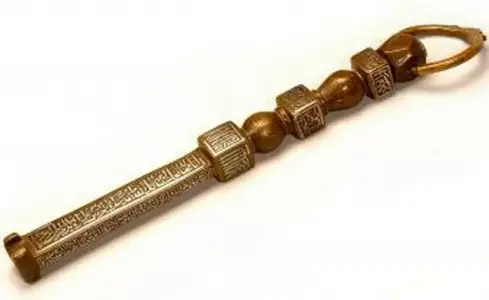Sadins, the keeper of Key to Kaaba generation over generation
Do you know who holds the key to kaaba?
The key to Kaaba is with the family of Uthman bin Talha ra and it will remain with them until Qiyamah. The Prophet (ﷺ) summoned Uthman bin Talha (رضي الله عنه) and told him, “The key shall remain with you and none but a tyrant shall take it from you.”
After Uthman bin Talha (رضي الله عنه) died, his cousin Shaybah received the key and this heirloom has remained amongst his progeny. His descendants are alive to this day and they are commonly known as the Shaybi people.
It is custom for the key to be with the oldest tribe member.
The Bani Shaiba or the sons of Shaiba are the tribe that hold the keys to the Kaaba today. They are in charge of the ‘Sudnah’ of the Kaaba which means the complete care of it including opening and closing it, cleaning and washing it, and caring for its Kiswah or cladding.
Description of key to kaaba
Key is made of metal and is 35 centimeters long. It was changed and developed several times throughout the centuries. Today, the key and lock of the Kaaba are made of nickel plated with 18-carat gold while the interior Kiswah or cladding of the Kaaba is green after it has historically been red.
Key has its own pouch which has green embroidery.
The shape of the key changes every now and then. There is a museum in Turkey with 48 keys to the Kaaba since the Ottoman era, while in Saudi Arabia there are two replicas of the key that are made of pure gold.

History of Passing of Key to Kaaba over generations
- The Prophet Ebrahim (عليه السلام) and his son Prophet Ismail (عليه السلام) were the first guardian of the kaaba.
- Jurham tribe took control of the kaaba and then the tribe of Khuza’a became the custodian of kaaba after ousting the jurham tribe from Kaaba
- Qusay bin Kilab, a direct ancestor of the Prophet (ﷺ) married the daughter of the leader of Khuza’ha tribe. He was treated as a son despite him being son in law. The guardianship of kaaba came under his hands.
- Qusay bin Kilab passed on the tradition to his son Abd Munaf. However, shortly before his death he transferred guardianship of the Ka’bah to his eldest son Abd al-Dar as a way of honouring him.
- It then moved from person to person until the key was possessed by Uthman bin Talha at the time of the Muslim conquest of Makkah.
- The Prophet (ﷺ) and the Sahabah entered Makkah victoriously in the year 630 CE (8 AH). Upon entering the Haram, the Prophet (ﷺ) went to the Ka’bah but found it was locked. Uthman bin Talha, who wasn’t a Muslim at the time, had locked it and hidden himself on the roof of the Ka’bah.
- Ali (رضي الله عنه) was instructed by the Prophet (ﷺ) to go and find him and retrieve the key. He tracked him down, snatched the key from him and opened the door of the Ka’bah. The Prophet (ﷺ) went inside and performed two raka’hs of salah.
- Abbas (رضي الله عنه), the uncle of the Prophet (ﷺ) then made a request: “You know that our family is in charge of pouring water for the pilgrims who come for Hajj, If you hand the key over to us, we will have two points of honour, one is to pour the water and the other to open and lock the door of the Ka’bah as and when necessary.”
- Upon this, Allah (ﷻ) revealed a verse of the Quran in through the angel Jibraeel (عليه السلام):
Allah is commanding you to return the trusts to those whom they belong to.“Quran (4:58)
- The Prophet (ﷺ) immediately understood what this meant. He got up, gave the key back to Ali (رضي الله عنه) and told him to return it to Uthman bin Talha.
- Ali (رضي الله عنه) went to Uthman bin Talha and returned the key, apologising for the harsh way in which he had taken it from him. Uthman bin Talha was surprised at the gesture and asked the reason why. On being told that a verse of the Quran had been revealed regarding him to the Prophet (ﷺ) about returning this trust, Uthman bin Talha accepted Islam.
- The Prophet (ﷺ) summoned Uthman bin Talha (رضي الله عنه) and told him, “The key shall remain with you and none but a tyrant shall take it from you.”
- After Uthman bin Talha (رضي الله عنه) died, his cousin Shaybah received the key and this heirloom has remained amongst his progeny. His descendants are alive to this day and they are commonly known as the Shaybi people. The wording of the Hadith tells us that the family of Uthman bin Talha (رضي الله عنه) would remain until the Day of Qiyamah and they will always retain the honour of having possession of the key.
- The above statement of the Prophet (ﷺ) is extraordinary because although many powerful monarchs have reigned throughout the ages, Allah has always preserved this great honour amongst the Shaybah family. This will continue and none will be able to snatch the honour away from them. Today the key is still in their possession.
Recent ‘Sadins’ (Keepers) from the family of Uthman bin Talha (رضي الله عنه)
- Shaykh Abdul-Aziz al-Shaybi was the sadin of the Ka’bah for 18 years, until he passed away in 2010.
- The deceased brother, Shaykh Abdul Qader al-Shaybi became the new sadin. He passed away in 2015.
- Dr. Saleh Bin Taha Al-Shaibi, the oldest member of the Shaybah family, is the new keeper of Ka’bah. He is the 109th successor of Uthman bin Talha (رضي الله عنه).

Reference: Al Arabiya, Islamiclandmarks
Discover more from Islam Hashtag
Subscribe to get the latest posts sent to your email.




